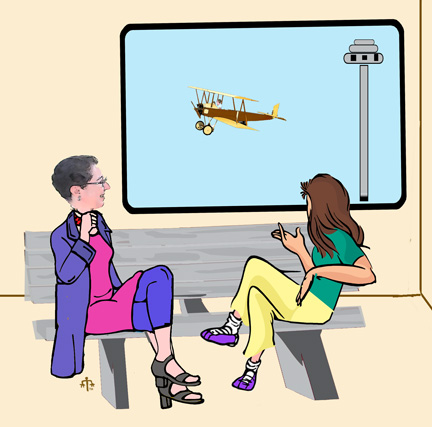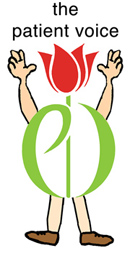|
Helping other people with Parkinson's make a positive difference in their lives often requires nothing more than being in the right place at the right time, and saying the right thing. I discovered this while "people watching" at the Fort Lauderdale Airport one day last winter. There, walking toward me, with a gait much like mine, was a woman who looked to be 5 – 10 years my senior. I was certain she, too, had PD.
Anita, as she introduced herself, sat down beside me to wait for her daughter's return from the rental car lot, as I was waiting for my husband's. With no prompting, she launched into the telling of her medical history. It seems she had been healthy her whole life until the last year when she started to have one mystery medical symptom after another. After seeing countless specialists and undergoing every test imaginable, she told me, she still had no diagnosis. I was tempted to offer my own, but reconsidered, knowing that the "unauthorized practice of medicine" is a criminal offense, with potentially severe penalties.
I asked Anita whether she had seen a Movement Disorders Specialist (MDS), a neurologist who has had additional training in disorders that mainly affect physical movement, such as Parkinson's.
"Do you think that's what I have?" Anita asked me, looking like a deer caught in the headlights.
"I can't say; I'm not a doctor," I told her. "It just seems to me that if you've seen every other kind of medical specialist and still have no answers, you might as well complete the circle."
Upon learning that Anita lives in Washington D.C., I suggested she look for an MDS at one of the universities or teaching hospitals in the metro area. Just then, her daughter and my husband came walking towards us. We marveled that our chance encounter was meant to be, and wished each other good luck on our individual journeys. Before going our separate ways, my husband and "agent" handed the two women my pdplan4life.com business cards, should they have any further questions.

top |

Not really expecting to hear from Anita again, I was pleasantly surprised to pick up my phone several months later and hear a familiar voice asking if I remembered meeting her at a Florida airport.
"Yes, of course I remember you," I said.
"Well, I'm calling to thank you for your advice, and let you know that I found an MDS at Johns Hopkins who diagnosed me with Parkinson's, and started me on medicine," she said. "I feel like a new person."
Her words were the best gift she could have given me. We all want to feel needed, and able to make a positive difference in the lives of others. Perhaps this is especially true for those of us living with a progressive, incurable disease, as we often benefit from the kindness of strangers.
"I am only one, but I am one. I cannot do everything, but I can do something. And I will not let what I cannot do interfere with what I can do."**
**Edward Everett Hale


|







